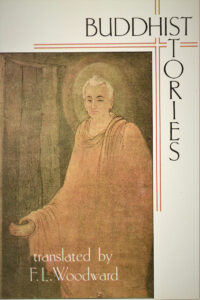Buddhist Stories
Translated by Frank Lee Woodward (1871 - 1952).
140 Pages | First edition 1925, reprint 1994 | Softcover | Theosophical Publishing House, Adyar | ISBN: 8170592380.
The stories appearing in this book are translated from The Commentary on the Dhammapada. They were originally published in the Magazines The Young Citizen and The Adyar Bulletin. They illustrate the moral teachings of Buddhism in a simple and easy form.
F. L. Woodward was an authority on Buddhist teachings; many of his publications were published by the Pali Text Society, among them Pictures of Buddhist Ceylon, The Buddha's Path of Virtue and Francis Bacon and the Cipher Story. He could be considered part of the noble band of Theosophists, who had worked for the revival of Buddhism in Sri Lanka under the leadership of Colonel Henry Steel Olcott (1832 - 1907).
From Chapter XXI - 'This Little Body Holdeth All' (p. 120):
" Not to be reached by going is world's end.
Yet is there no release for man from woe,
Unless ye reach world's end. Yea verily
He that is wise and lives the holy life,
He knows the world. He goeth to world's end.
Calmed is he, for he knows. He hankereth
Neither for this world nor for any world. "
From: Anguttara Nikāya (ii., p. 46).
 Bezig met bijwerken...
Bezig met bijwerken...